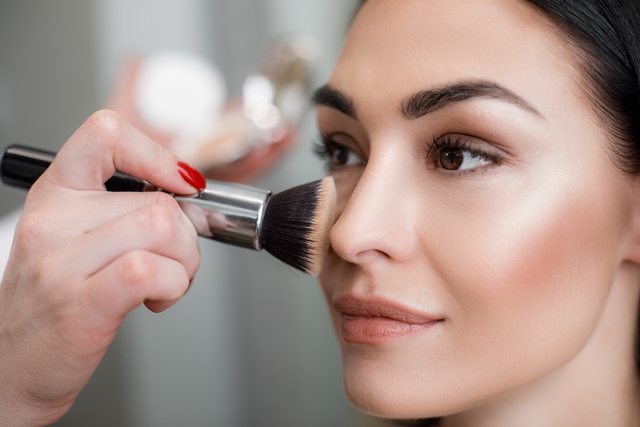Makeup helps highlight our facial features and make us look glamorous for parties and special events. But the question is, does it really benefit our skin? Aside from making us look classy and flawless during events, are there any lasting benefits of makeup in our skin?
 |
| Can Makeup Products Benefit Your Skin? |
First let's take a
look at some of the ingredients found in the majority of makeup products. As
you are probably aware, there are many different types of makeup because the
cosmetics industry is a very big business. Of course, the manufacturers want
you to believe that the makeup they are selling is good for your skin.
Unfortunately, not
all products are really what they claim to be. Many makeup products have
alcohol, mineral oil, and other chemicals that can cause your skin to break
out, or get flaky. If the makeup product contains alcohol, it is more likely
going to have a stinging and drying effect on the face. That’s because alcohol
can strip the face of its natural oils. Most products also contain
preservatives, antibacterial agents, and other chemicals that can be harmful to
your health.
No, we go back to the question. Can makeup products benefit your skin? Well, it depends. If you know what to look for, you can choose an array of makeup products that are beneficial to your skin. Here’s how you can do that:
How To Choose Makeup
Products That Can Benefit Your Skin
1. Determine Your
Skin Type
There are many
different types of makeup products to choose from today. From anti-aging makeup
products which you can check here, hydrating products, and whitening solutions,
finding the right one can be confusing.
Fortunately, you can
significantly narrow down your options by identifying your skin type. This way,
you know which ingredients to avoid. There are five major types of skin. The
first is normal, which doesn’t require special care.
Second is sensitive
skin, which is prone to reacting to harsh ingredients. Dry skin is the third
type, which can be caused by low air humidity and exposure to hot water.
However, it can also be due to genetic predisposition.
The fourth type is
oily skin, which is characterized by a humid and bright appearance. Lastly,
combination skin exhibits the traits of oily and dry skin, with more greasiness
in the T-zone or the forehead, nose, and chin.
2. Be Mindful of the
Ingredients
It’s a good rule of
thumb to only buy cosmetics that are good for your skin type. If you have oily
skin, then you should get a moisturizer. If you have dry skin, then the product
should be much gentler, but also moisturizing. Always check the label to make
sure you're buying a product that is free from chemicals and harmful toxins.
The most common ones to avoid are parabens, formaldehyde, and artificial
fragrances.
There are many great
natural-based products available that will not irritate or dry out your skin.
This includes makeup products that have Aloe Vera, Coconut, and Ethyl
Macadamiate, among others.
Furthermore, beware
of companies that misrepresent or mislabel the ingredients of their makeup
products. For example, petroleum and mineral oil—which clogs pores and cause
pimples—can be listed as ‘essential oils,’ but these are actually harmful for
your skin.
3. Find Multi-Purpose
Products
You can now find
specialized products for your skin type and lifestyle. For instance, if you’re
in your 30s, it’s recommended that you start exploring anti-aging products to
minimize the appearance of wrinkles and fine lines. For example, some
foundations are now infused with anti-aging properties and sunblock protection.
This means that it can work both as a foundation and as sun protection as well.
Meanwhile, on the
other hand, if you suffer from acne, you’d want to purchase cosmetics that
won’t irritate your rashes and pimples. So, look for products that have
soothing ingredients like Tea Tree Oil and Aloe Vera.
Choosing makeup isn’t a one-size-fits-all approach. What could be effective for others might not suit your skin well. Knowing this, you should determine your skin type as well as its strengths and weaknesses. Consult your dermatologist or aesthetician if you have any questions about which make up is best for your skin, and what kinds of ingredients should you avoid. And if you're already using makeup, you must learn how to use them and wash them off properly at the end of the day to avoid skin irritation.


No comments:
Post a Comment
Please Leave a Comment to show some Love ~ Thanks